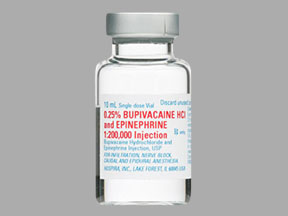
Bupivacaine-epinephrine (pf) Coupons & Savings Card – Discount Prices from $1.01
Generic for: Sensorcaine-mpf/epinephrine, Marcaine/epinephrine pf
Bupivacaine with epinephrine is a combination medication used to provide local or regional anesthesia during various medical procedures, including surgeries, dental work, and childbirth. Bupivacaine is a local anesthetic that blocks nerve signals, leading to numbness in the targeted area. Epinephrine, a vasoconstrictor, is added to constrict blood vessels at the injection site, which slows the absorption of bupivacaine into the bloodstream, prolonging its anesthetic effect and reducing bleeding. This combination is administered by healthcare professionals and is available in different concentrations tailored to specific procedures. While generally safe, potential side effects include nausea, dizziness, and, in rare cases, allergic reactions. It's important to inform your healthcare provider of any existing health conditions or medications to ensure the safe use of this anesthetic.
Our coupons are free to use. Before paying, show the pharmacist your Bupivacaine-epinephrine (pf) savings card to get your free discount. Use our filters below to edit the prescription box to match your needs. The Bupivacaine-epinephrine (pf) prices will update based on your prescription needs. Above our Bupivacaine-epinephrine (pf) coupons, you can change your location to see pharmacy prices and costs in other areas. We're here to help you buy Bupivacaine-epinephrine (pf) at the lowest price with our prescription discount card.
My prescription
Edit
10ML of 0.25%-1:200000, Bupivacaine-epinephrine (pf) (1 Vial)
Select pharmacy

CVS
$22.47
COUPON PRICE
Walmart
$1.01
COUPON PRICE
Albertsons
$4.62
COUPON PRICE
Walgreens
$4.62
COUPON PRICEBupivacaine-epinephrine (pf) savings card
Show this card to your pharmacist
Walmart
$1.01
BIN
ID
PCN
GRP
019876
LHCE3E90B8
CHIPPO
LHX
Powered by
Bupivacaine with epinephrine is a combination medication used to provide local or regional anesthesia during various medical procedures, including surgeries, dental work, and childbirth. Bupivacaine is a local anesthetic that blocks nerve signals, leading to numbness in the targeted area. Epinephrine, a vasoconstrictor, is added to constrict blood vessels at the injection site, which slows the absorption of bupivacaine into the bloodstream, prolonging its anesthetic effect and reducing bleeding. This combination is administered by healthcare professionals and is available in different concentrations tailored to specific procedures. While generally safe, potential side effects include nausea, dizziness, and, in rare cases, allergic reactions. It's important to inform your healthcare provider of any existing health conditions or medications to ensure the safe use of this anesthetic.
Our coupons are free to use. Before paying, show the pharmacist your Bupivacaine-epinephrine (pf) savings card to get your free discount. Use our filters below to edit the prescription box to match your needs. The Bupivacaine-epinephrine (pf) prices will update based on your prescription needs. Above our Bupivacaine-epinephrine (pf) coupons, you can change your location to see pharmacy prices and costs in other areas. We're here to help you buy Bupivacaine-epinephrine (pf) at the lowest price with our prescription discount card.
Bupivacaine-epinephrine (pf) dosage forms
Use our Bupivacaine-epinephrine (pf) 10ML of 0.25%-1:200000 coupon with prices from $1.01 for 1 Vial. You can also use our Bupivacaine-epinephrine (pf) 10ML of 0.5%-1:200000 coupon with prices from $1.01 for 1 Vial. We have a Bupivacaine-epinephrine (pf) 10ML of 0.5%-1:200000 coupon with prices from $3.77 for 2 Vials. You can use our Bupivacaine-epinephrine (pf) 10ML of 0.5%-1:200000 coupon with prices from $8.15 for 3 Vials.
Dosage Quantity Price from Per unit 10ML of 0.25%-1:200000 1 Vial $1.01 $1.01 10ML of 0.5%-1:200000 1 Vial $1.01 $1.01 10ML of 0.5%-1:200000 2 Vials $3.77 $1.89 10ML of 0.5%-1:200000 3 Vials $8.15 $2.72 10ML of 0.25%-1:200000 2 Vials $3.14 $1.57 10ML of 0.25%-1:200000 3 Vials $7.21 $2.40
| Dosage | Quantity | Price from | Per unit |
|---|---|---|---|
| 10ML of 0.25%-1:200000 | 1 Vial | $1.01 | $1.01 |
| 10ML of 0.5%-1:200000 | 1 Vial | $1.01 | $1.01 |
| 10ML of 0.5%-1:200000 | 2 Vials | $3.77 | $1.89 |
| 10ML of 0.5%-1:200000 | 3 Vials | $8.15 | $2.72 |
| 10ML of 0.25%-1:200000 | 2 Vials | $3.14 | $1.57 |
| 10ML of 0.25%-1:200000 | 3 Vials | $7.21 | $2.40 |
